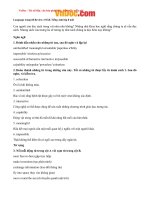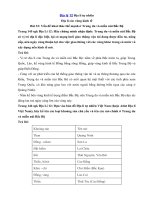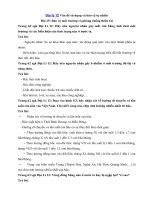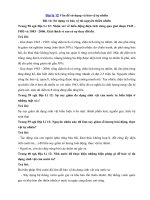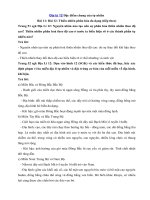Tải Giải bài tập SGK Tiếng Anh lớp 12 Chương trình mới: Review 1 (Unit 1 - 2 - 3) - Để học tốt Tiếng Anh 12 Thí điểm
Bạn đang xem bản rút gọn của tài liệu. Xem và tải ngay bản đầy đủ của tài liệu tại đây (89.67 KB, 6 trang )
<span class='text_page_counter'>(1)</span><div class='page_container' data-page=1>
<b>Language (Ngôn ngữ) - trang 42 Review 1 (Units 1 - 2 - 3) SGK tiếng anh 12 mới</b>
Tổng hợp các bài tập trong phần Language (Ngôn ngữ) - trang 42 Review 1 (Units 1 - 2 - 3) SGK tiếng
anh 12 mới
<b>1 Use the correct form of the words in the box to complete the sentences. (Sử dụng các hình thức</b>
đúng của các từ trong hộp để hoàn thành câu.)
Đáp án:
1. preservation
2. distinguished
3. respectable/ respected
4.urbanisation
5. disposal
6. industrialisation
<b>2 Match the words on the left with the words on the right to form compound adjectives. Then use</b>
<b>them to complete the sentences. (Khớp các từ trên trái với những từ ở bên phải để tạo thành tính từ</b>
ghép. Sau đó sử dụng chúng để hoàn thành câu.)
Đáp án:
1. thought-provoking 2. off-peak
3. well-planned 4. long-term 5. worldwide
<b>3 Listen and write the correct words in the blanks. Then practise reading the sentences. (Nghe và</b>
viết các từ đúng vào chỗ trống. Sau đó, thực hành đọc các câu.)
Đáp án:
1.their, They're
2. council, counsel
3.Where, wear
4. made, maid
5. red, read
<b>4 Complete the sentences, using the correct form of the verbs in the box. (Hoàn thành các câu, sử</b>
dụng hình thức đúng của động từ trong hộp.)
Đáp án:
1. (should) join
2. (should) complete
</div>
<span class='text_page_counter'>(2)</span><div class='page_container' data-page=2>
4. (should) offer
5. (should) be provided
<b>5 Put the verbs in brackets in the past simple or past continuous. (Đặt động từ trong ngoặc ở thì quá</b>
khứ đơn hoặc quá khứ tiếp diễn.)
Đáp án:
1. was walking
2. saw
3. was standing
4. came
5. realised
6. stopped
7. helped
8.led
9. met
10. was waiting
11. said
12. was worrying
13. wondered
<b>6 Make compound or complex sentences, use the prompts and the words in brackets (Tạo câu</b>
phức hay câu ghép, sử dụng các hướng dẫn và các từ trong ngoặc)
1. If students (can) keep their homes and schools green and clean, they will contribute to the Go Green campaign.
2.
3. The burning of fossil fuels emits harmful gases, but people still use them for heating and cooking
4. The city buses and taxis use noise reduction devices and run on environmentally friendly fuels
5. Many residents use coal fires for cooking, which can seriously pollute the air of the city
6. They use corn to make bio-fuels, which may lead to food shortage
<b>Skills (Kỹ năng) - trang 44 Review 1 (Units 1 - 2 - 3) SGK tiếng anh 12 mới</b>
Tổng hợp các bài tập có trong phần Skills (Kỹ năng) - trang 44 Review 1 (Units 1 - 2 - 3) SGK tiếng anh
12 mới
</div>
<span class='text_page_counter'>(3)</span><div class='page_container' data-page=3>
<b>Counter-urbanisation</b>
<b>1 Read the text about the causes and effects of counter-urbanisation. (Đọc văn bản về các ngun</b>
nhân và ảnh hưởng của phản đơ thị hóa.)
While urbanisation has led to fast urban growth, counter-urbanisation has resulted in the opposite
situation. Counter-urbanisation happens when a great number of people move from urban areas into
rural areas.
This phenomenon is linked to the ‘push' and "puli’ factors of migration. Trying to avoid overcrowded
inner cities, city dwellers look for larger, cleaner and quieter houses with more land at cheaper prices in
rural or suburban areas. They want to escape the air and noise pollution, and the crime in inner cities.
However, counter-urbanisation causes serious problems in the shrinking cities. These cities face severe
economic strain and a sharp increase in poverty. Despite declining populations, they still have to spend
money maintaining infrastructure, such as roads, sanitation, public transport, etc., built for a much larger
population.
Meanwhile, villages in the countryside become increasingly urbanised, grow fast and soon lose their
uniqueness and charm. Local prices go up because city migrants have more money. They earn money
from well-paid city jobs and high-valued city properties. Villagers often find it more and more difficult
to earn a living and provide for their families.
Counter-urbanisation has caused many negative effects. Governments should find urgent short-term
solutions before implementing a long-term comprehensive programme to make life sustainable for
people in both urban and rural areas.
<b>2 Read the text again and decide whether the following statements are true (T), false (F), or not</b>
<b>given (NG), and tick the correct box. (Đọc văn bản một lần nữa và quyết định việc các nhận định sau</b>
đây là đúng (T), sai (F), hoặc không xác định (NG), và đánh dấu vào ô đúng.)
1. Urbanisation and counter-urbanisation are two opposite trends.
2. City dwellers look for houses in rural or suburban areas just because they are cheap.
3. Shrinking cities still face high rates of crime.
4. When populations decline, cities spend less money on maintaining infrastructure.
5. Country villages quickly lose their unique character and charm when they become urbanised and grow fast.
6. Governments should offer immediate short-term solutions to make life sustainable for both urban and rural inhabitants.
Đáp án:
1.T 2. F 3. NG
4.F 5.T 6. F
<b>3 Work with a partner. Use the information in the table below or your own ideas to make a</b>
<b>conversation about one of the historical figures. (Làm việc cùng người bạn. Sử dụng các thông tin</b>
</div>
<span class='text_page_counter'>(4)</span><div class='page_container' data-page=4>
People & facts Reasons for being respected
1 The Trung Sisters/Two Ladies Trung (AD 14-43)
- National heroines, leaders ofTrung
Sisters'uprising/first national uprising against the
Han invaders (AD 40-43)
- Freed the country; Trung Trac became Queen;
Trung Nhi-top adviser (AD 40)
- Bravery and perseverance
- First female rulers of the nation
2 Lady Trieu (Trieu Thi Trinh) (AD 226-248)
- Courageous female warrior
- Leader of the Vietnamese people against theWu
invaders (AD 248)
- Image of a brave warrior going into battles on
an elephant
- Given the honorary title ‘Most Noble,
Courageous and Virtuous Lady’ by King Ly
Nam De (AD 503-548)
3. Emperor Quang Trung (1753-1792)
- National hero
- Leader of the Vietnamese people against the
Qing invaders (1788-1789)
- Very talented political and military leader
- Economic and educational reforms
Ví dụ:
Student A: Who are you going to talk abcwr in your presentation tomorrow?
StudentB: I'm going to talk about our national hero - Emperor Quarng Trung. He was a very talented
political and military leader.
He led the Vietnamese people against the Qing invaders between 1788 and 1789.
Student A: You should also mention the year of his birth and death. The Emperor was born in 1753
and died in 1792.
Student B: I will. Though he died young, he was able to introduce some very important economic and educational
reforms in Viet Nam
<b>4 Listen to the recording about wave energy. Choose the best option to complete the sentence. Nghe</b>
<b>đoạn ghi âm về năng lượng sóng. Chọn lựa chọn tốt nhất để hoàn thành câu.</b>
1. Wave energy, produced by ocean surface waves, is both .
A.friendly and efficient
B.eco-friendly and efficient
C. eco-friendly and cost-efficient
</div>
<span class='text_page_counter'>(5)</span><div class='page_container' data-page=5>
A. 50 times B. 500 times C. 5000 times
3. Building and operating wave power stations in the ocean is far _____ than on land.
A. more expensive
B.more difficult
C. more expensive and difficult
4. Salt water is a very hostile environment to devices, which become________ and cannot last long.
A. rusty easily B. rusty slowly C. rusty
5. Progress in renewable energy technology will soon allow Viet Nam to______effectively and
efficiently.
A.export wave energy
B.exploit wave energy
C. explore wave energy
Hướng dẫn:
1. C 2. B 3.C
4.A 5.B
As you know, the burning of fossil fuels like coal, oil and natural gas emit greenhouse gases. That is
why environmentalists insist that we use clean, renewable energy sources. Wave energy, produced by
ocean surface waves, is both eco-friendly and cost-efficient. Research has suggested that ocean wave
power could make a major contribution to the world's energy resources. Scientists claim that using 1%
of wave energy can provide the equivalent of 500 times the world energy consumption. With 70% of the
earth's surface covered with water, wave energy is undoubtedly a valuable source of green energy.
However, there is the challenge of converting wave power into energy and transmitting it to shore.
Building and operating wave power stations in the ocean is far more expensive and difficult than on
land. Also, salt water is a very hostile environment to devices. They go rusty easily and cannot last as
long as those on shore. Sea waves make energy harvesting even harder by moving up and down most of
the time.
Viet Nam has a long coastline with great potential for producing wave energy. Hopefully, advancements
in renewable energy technology will soon allow us to exploit wave energy effectively and efficiently.
<b>5 Write meaningful sentences about the pros and cons of solar energy. Use the words given (Viết</b>
câu có ý nghĩa về những ưu và khuyết điểm của năng lượng mặt trời. Sử dụng các từ cho trước)
Gợi ý đáp án:
1. Solar energy comes directly from the sun and this renewable energy source is sustainable
2. This type of energy is environmentally friendly and does not cause pollution
3. Solar energy is available everywhere and is very quiet because solar energy/its devices do not have any moving parts
</div>
<span class='text_page_counter'>(6)</span><div class='page_container' data-page=6>
5. Solar energy is not always available since access to sunlight is limited at certain times
6. Although it is greener than fossil fuels, the production of solar panels may emit some greenhouse gases
<b>6 Use the ideas in 5 (and your own ideas) to an essay of 180-250 words about the pros cons of</b>
<b>solar energy.</b>
Sử dụng các ý tưởng trong 5 (và những ý tưởng riêng của mình) để viết một bài luận khoảng 180-250 từ về những ưu
khuyết điểm của năng lượng mặt trời.
Gợi ý:
Nowadays, it has become necessary to use green technology with green renewable energy sources.
Among all green energy sources, solar energy is the most important renewable energy source, which has
both advantages and disadvantages.
First of all, solar energy comes directly from the sun and this abundant renewable energy source is
sustainable. In general, this type of energy is environmentally friendly and does not cause pollution.
Another advantage is that solar energy is available everywhere in the world, not only in hot and sunny
countries near the Equator. Furthermore, it is very quiet because solar energy devices do not have any
moving parts.
However, solar energy is not cheap. Solar panels are expensive to produce as they use rare and special
materials. In addition, the technology used to store solar energy is costly. A further disadvantage is that
solar energy is not always available since access to sunlight is limited at certain times. Furthermore,
although it is greener than fossil fuels, the production of solar panels may emit some greenhouse gases.
</div>
<!--links-->

